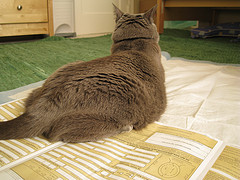Most of the time, passport applications get processed without a hitch. Oh sure, it takes awhile – about six weeks for regular processing and three weeks if you expedite your application. However, if you’re patient, your new passport should turn up in the mailbox within the appropriate period of time.
Unfortunately, sometimes your passport application can get “stuck” in limbo as the Department of State needs more information before they will process it. Here are some of the most common passport application roadblocks, along with strategies for dealing with them.
Back Child Support
If you owe more than $ 2,500 in back child support, the government will not issue you a passport. However, the State Department will hold your application for 90 days to allow you to pay your account down below that amount. After 90 days, you have to reapply and pay the application fee all over again.
Even after you pay up, the hold on your passport will not be lifted automatically. Instead, you must contact the Office of Child Support Enforcement for the state in which you owe child support. Some states will require you to pay the entire balance before they’ll release you, even if you pay enough to owe less than $ 2,500.
After your state Office of Child Support Enforcement has released you from the program, you should receive your passport within seven business days.
Birth Certificate Issues
Birth certificate issues are another potential problem. These can range from easily corrected issues (like sending the wrong type of birth certificate) to problems that are more difficult to handle.
Most birth certificate issues can be prevented by carefully checking your birth certificate prior to sending it. It must be issued by the state you were born in (not the hospital) and it must have a raised, embedded, embossed or multi-colored seal. Also, make sure it has both of your parents’ names on it and that it was issued less than one year after you were born.
If your birth certificate was issued more than one year after you were born, you may need to include additional evidence that you were born in the US. If your delayed birth certificate lists the documents used to create it and includes a signature from a birth attendant, you may be able to submit it alone. Otherwise, you’ll need as many early public records as possible. These could include a baptismal certificate, hospital birth certificate, census record, doctor’s record or early school record.
All US citizens are entitled to a passport, but when it comes to proving your citizenship, the government places the burden of proof on you. Occasionally, if they suspect that your birth certificate may have been falsified, they may refuse to issue a passport unless you provide a great deal of personal background information. This usually occurs to people delivered near the US border by physicians or midwives with a previous record of falsifying documents. That doesn’t mean that your documents were falsified, but it does mean that you may not be able to get a passport unless you can provide all of the supporting information that the government requests.
If this happens to you, submit as much of the requested information as you can get. If you can’t get everything that the Department of State asks for, submit what you do have and explain why you can’t get the rest. If you continue to have problems, contact your congressional representative and ask for assistance with your passport application.
Other Issues
Other issues can include not making out the check or money order correctly or not completing the application properly. These issues can generally be corrected easily by contacting the National Passport Information Center at 1-877-487-2778 or by re-submitting your application.
Alison Kroulek is a freelance writer and blogger with a focus on the travel industry.

